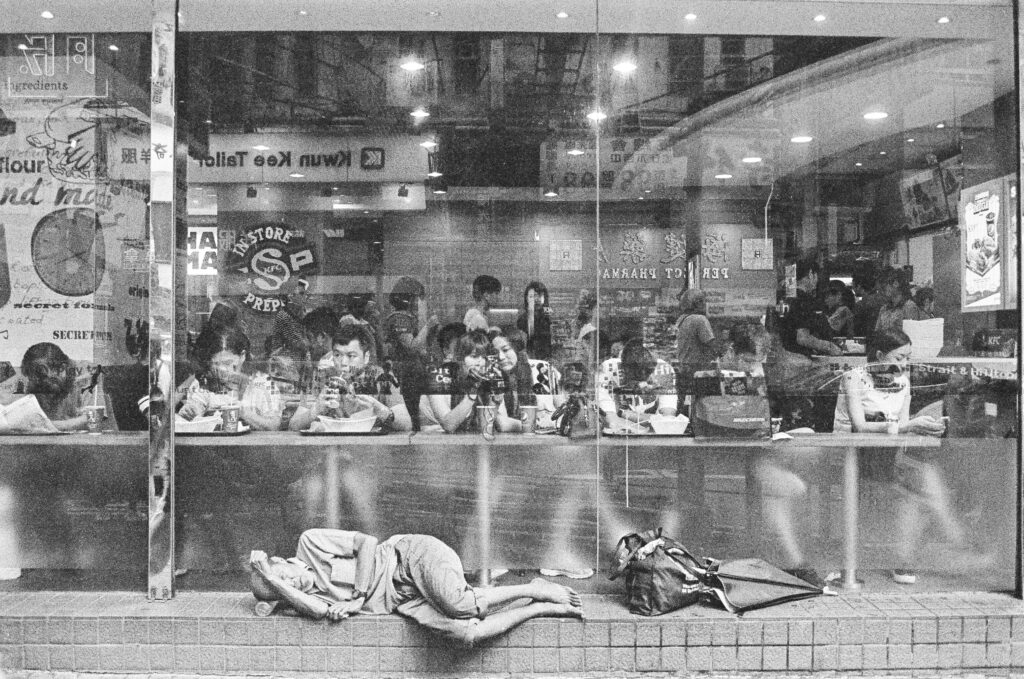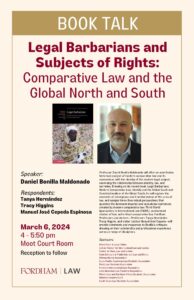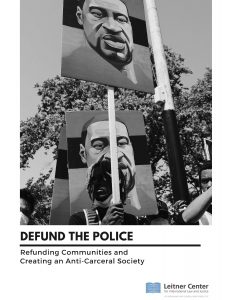
Hong Kong’s shifting political landscape exacerbates the unseen struggles of migrants
NEW YORK/HONG KONG (December 15, 2023) – Degrading human rights protections in Hong Kong are having a disproportionate impact on migrant domestic workers, immigration detainees, refugees and asylum seekers, and migrant children, a new report from the Leitner Center argues.
This is exacerbated by the silencing of Hong Kong’s once vibrant civil society amid a shifting political landscape and the chilling effect of the Beijing-imposed National Security Law, which is restricting civil liberties, democracy and freedom of speech.
“Unseen struggles: Addressing migrant rights in Hong Kong” explores this hidden plight and recommends how human rights can be upheld to improve the well-being of hundreds of thousands of people.
Migrant domestic workers
Migrant domestic workers are critical to Hong Kong’s economy. The city’s professionals rely on these poorly paid migrant domestic workers to raise their children, care for their aging parents, cook their food and clean their homes, enabling them to work full-time.
Yet these workers, who are 98.5 percent women, are often overworked, abused and exploited. Around one in six have experienced forced labor or been trafficked, according to a 2016 survey. Issues such as these remain undetected, with migrant domestic workers often remaining unwilling to report abuse due to fears of losing their jobs.
These women suffer from long and unregulated working hours and a minimum monthly salary of HK$4,730 (US$600) – a fraction of the minimum wage for other workers. Meanwhile, unscrupulous recruitment agencies charge exorbitant fees, leaving many migrant domestic workers in debt bondage, unable to escape potentially abusive employers.
Refugees and asylum seekers
Refugees in Hong Kong can apply for protection against return to their home country if they are at risk of ill-treatment, but few of these cases are accepted under the government scheme.
Between March 2014 and July 2023, 22,744 individuals sought protection from persecution and conflict in Hong Kong. Of these, just 301 were approved, with the rest facing removal from Hong Kong. The Immigration Department applies an unreasonably high threshold for people giving evidence of the threats of abuse they face in their home country.
While cases are ongoing, claimants receive basic government support, designed only to prevent destitution. Some go without food, shelter or medical care, and most live in overcrowded, unsanitary accommodation.
Immigration detainees
Most refugees and asylum seekers will face immigration detention in Hong Kong. The system allows for prolonged, indefinite confinement in poor, often prison-like conditions where no independent body oversees the facilities.
Detainees experience excessive handcuffing, solitary confinement, inadequate health care, and little privacy, with widespread CCTV use, including in bathrooms and cells. Despite laws safeguarding these rights, there is little opportunity to communicate confidentially with the outside world.
“This is supposed to be a non-punitive facility, but when they are taken to hospital … they are handcuffed to the bed,” an interviewee told the report’s researchers.
Marginalized migrant children
Hong Kong’s marginalized migrant children cut across all the above groups. They live in a legal quagmire where access to education and anything beyond basic health care is difficult. They struggle to find their place in a society that frequently overlooks their needs and rights, treating them as outsiders. This leaves them enduring poverty and instability for protracted periods.
Even when children can attend school, these institutions often fail to meet language needs and discriminate on religious or ethnic grounds.
Hong Kong must act to improve the lives of migrants
Hong Kong can improve the conditions for marginalized migrants. It can enact stronger laws that protect migrant domestic workers by paying them fairly and making it easier to escape abusive employers. It can ensure refugees are adequately protected and issued residence permits in line with international standards. Immigration detention centers can better safeguard detainees’ rights, and alternatives to incarceration can be used. The Government must guarantee that all children can access appropriate education, health care, and support to ensure an adequate standard of living
Martin Flaherty, Faculty Co-Director of the Leitner Center, said: “Marginalized migrants face not only the broader issues affecting Hong Kong, such as the erosion of civil liberties and human rights abuses, but also systemic challenges like poverty, homelessness, and limited access to justice and health care services. Compounding their issues is a legal system that contributes to their discrimination and exploitation, and does not comply with international standards.
“It is telling that a report on human rights issues in Hong Kong was hindered by the ongoing repression of civil society and individual rights in the city. If the climate of fear that hangs like a dark cloud over the islands of Hong Kong were not there, more advocates on these issues would undoubtedly be willing to speak out and enable change.
“Not only does the Hong Kong Government need to enact legislation to improve the lives of marginalized migrants, but it also needs to eliminate the laws, policies and practices that have caused people to silence themselves.”
—
A representative from the Leitner Center is available for interview.
Please find photos to use in reporting here (photo credit: “(c) The Leitner Center”).
A Chinese translation of this news release is available here.
About the report
The report was based on interviews, research, and freedom of information requests to the Hong Kong Government. Earlier in 2023, the Leitner Center made a submission to the United Nations Universal Periodic Review focusing on the rights of marginalized migrants and made specific recommendations to support greater respect for dignity and rights. This report expands on that submission. Interviewees for the report remain anonymous.
Media contact
leitnercenter@fordham.edu
+959959481869
About The Leitner Center
The Leitner Center for International Law and Justice at Fordham Law School trains law students to become international legal experts and impassioned human rights advocates through its pioneering human rights programs, clinics, and education initiatives; facilitates capacity building and advocacy with local social justice organizations and activists around the world; and contributes to critical research among scholars in international human rights. In particular, in cooperation with in-country partners, the Leitner Center works extensively in partnership with civil society organizations to support vulnerable populations, including in China. The Leitner Center respectfully presents this report to support and expand on its Stakeholder Submission in advance of China’s upcoming Universal Periodic Review (UPR) in the 45th session.
 March 6, 2024
March 6, 2024




 The defund the police/invest-divest movement envisions a future where all communities have enough government-funded resources to be healthy and safe from violence, including from state violence in the form of police brutality. The Walter Leitner International Human Rights Clinic has released a new report calling for reductions in police budgets and greater investments in social and economic community resources that will help communities thrive and increase public safety. The report highlights the long-standing efforts of grassroots organizers, activists, and service providers that provide concrete examples of holistic alternatives to policing in the form of reduction of police budgets and investment in social and economic resources for underserved communities, violence interrupter programs, police-free schools and restorative justice, mental health crisis intervention teams, drug decriminalization and harm reduction programs, state-sponsored reparations for survivors of police violence, transformative justice interventions for gender- based violence, decriminalization of sex work, and community bailout funds. In addition to highlighting some of the work, achievements, and challenges of anti-carceral advocates, the report also debunks misconceptions about policing in the United States and the failed promises of police “reform.”
The defund the police/invest-divest movement envisions a future where all communities have enough government-funded resources to be healthy and safe from violence, including from state violence in the form of police brutality. The Walter Leitner International Human Rights Clinic has released a new report calling for reductions in police budgets and greater investments in social and economic community resources that will help communities thrive and increase public safety. The report highlights the long-standing efforts of grassroots organizers, activists, and service providers that provide concrete examples of holistic alternatives to policing in the form of reduction of police budgets and investment in social and economic resources for underserved communities, violence interrupter programs, police-free schools and restorative justice, mental health crisis intervention teams, drug decriminalization and harm reduction programs, state-sponsored reparations for survivors of police violence, transformative justice interventions for gender- based violence, decriminalization of sex work, and community bailout funds. In addition to highlighting some of the work, achievements, and challenges of anti-carceral advocates, the report also debunks misconceptions about policing in the United States and the failed promises of police “reform.”
